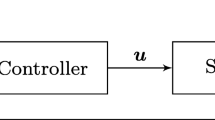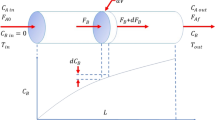Absract
An approximation method that can lower the computational complexity is presented to reduce the processing time of model predictive control (MPC). The effects of the inaccurate inputs, which are caused by the approximation errors, are reflected as input disturbances and are considered in the design of the controller. The closed-loop system’s stability is guaranteed by a restricted Lyapunov-based constraint and input constraints, ensuring that the states will be eventually bounded at a certain confidence level. According to this paper, the effects of the bounded disturbance can be observed via a change in the stability region. The relationship between the regions of the normal and approximated systems is highlighted. The proposed MPC with input disturbance and guaranteed Lyapunov stability is employed in a chemical process, and the simulation results indicate the efficiency of the proposed method.
Similar content being viewed by others
References
Qi W, Liu J F, Chen X Z, et al. Supervisory predictive control of standalone wind/solar energy generation systems. IEEE Trans Contr Syst Technol, 2011, 19: 199–207
Rigatos G, Abbaszadeh M, Siano P, et al. Nonlinear optimal control of electro-hydraulic actuators. IFAC J Syst Control, 2021, 15: 100130
Song R Z, Xiao W D, Sun C Y. A new self-learning optimal control laws for a class of discrete-time nonlinear systems based on ESN architecture. Sci China Inf Sci, 2014, 57: 068202
Zhang Z, Li H P, Shi Y, et al. Cooperative optimal control for Lipschitz nonlinear systems over generally directed topologies. Automatica, 2020, 122: 109279
Liu X J, Kong X B. Nonlinear model predictive control for DFIG-based wind power generation. IEEE Trans Automat Sci Eng, 2014, 11: 1046–1055
Qin S J, Badgwell T A. A survey of industrial model predictive control technology. Control Eng Practice, 2003, 11: 733–764
de la Pena D M, Christofides P D. Lyapunov-based model predictive control of nonlinear systems subject to data losses. IEEE Trans Automat Contr, 2008, 53: 2076–2089
Zheng Y, Wei Y S, Li S Y. Coupling degree clustering-based distributed model predictive control network design. IEEE Trans Automat Sci Eng, 2018, 15: 1749–1758
Zheng Y, Li S Y, Tan R M. Distributed model predictive control for on-connected microgrid power management. IEEE Trans Contr Syst Technol, 2018, 26: 1028–1039
Hertneck M, Kohler J, Trimpe S, et al. Learning an approximate model predictive controller with guarantees. IEEE Control Syst Lett, 2018, 2: 543–548
Drgoňa J, Picard D, Kvasnica M, et al. Approximate model predictive building control via machine learning. Appl Energy, 2018, 218: 199–216
Pavlov A, Shames I, Manzie C. Minimax strategy in approximate model predictive control. Automatica, 2020, 111: 108649
Zhang H, Li S Y, Zheng Y. Q-learning-based model predictive control for nonlinear continuous-time systems. Ind Eng Chem Res, 2020, 59: 17987–17999
Cseko L H, Kvasnica M, Lantos B. Explicit MPC-based RBF neural network controller design with discrete-time actual Kalman filter for semiactive suspension. IEEE Trans Contr Syst Technol, 2015, 23: 1736–1753
Lucia S, Karg B. A deep learning-based approach to robust nonlinear model predictive control. IFAC-PapersOnLine, 2018, 51: 511–516
Cao Y K, Gopaluni R B. Deep neural network approximation of nonlinear model predictive control. IFAC-PapersOnLine, 2020, 53: 11319–11324
Chen S, Saulnier K, Atanasov N, et al. Approximating explicit model predictive control using constrained neural networks. In: Proceedings of Annual American Control Conference (ACC), 2018. 1520–1527
Li D W, Xi Y G. Quality guaranteed aggregation based model predictive control and stability analysis. Sci China Ser F-Inf Sci, 2009, 52: 1145–1156
Ruan X G, Hou X Y, Ma H Y. Stability analysis of constrained MPC with CLF applied to discrete-time nonlinear system. Sci China Inf Sci, 2014, 57: 112201
Wan R X, Li S Y, Zheng Y. Model predictive control for nonlinear systems with time-varying dynamics and guaranteed Lyapunov stability. Int J Robust Nonlinear Control, 2021, 31: 509–523
Xu X, Chen H, Lian C Q, et al. Learning-based predictive control for discrete-time nonlinear systems with stochastic disturbances. IEEE Trans Neural Netw Learn Syst, 2018, 29: 6202–6213
Pannocchia G, Rawlings J B, Wright S J. Conditions under which suboptimal nonlinear MPC is inherently robust. Syst Control Lett, 2011, 60: 747–755
Allan D A, Bates C N, Risbeck M J, et al. On the inherent robustness of optimal and suboptimal nonlinear MPC. Syst Control Lett, 2017, 106: 68–78
Pourdehi S, Karimaghaee P. Stability analysis and design of model predictive reset control for nonlinear time-delay systems with application to a two-stage chemical reactor system. J Process Control, 2018, 71: 103–115
Choomkasien P, Chomphooyod P, Banjerdpongchai D. Design of model predictive control for industrial process with input time delay. In: Proceedings of the 17th International Conference on Control, Automation and Systems (ICCAS), 2017. 625–630
Sontag E D. A ‘universal’ construction of Artstein’s theorem on nonlinear stabilization. Syst Control Lett, 1989, 13: 117–123
Heidarinejad M, Liu J F, Christofides P D. Economic model predictive control using Lyapunov techniques: handling asynchronous, delayed measurements and distributed implementation. In: Proceedings of the 50th IEEE Conference on Decision and Control and European Control Conference, 2011
Acknowledgements
This work was supported by National Key R&D Program of China (Grant No. 2018AAA0101701) and National Natural Science Foundation of China (Grant Nos. 62073220, 61833012).
Author information
Authors and Affiliations
Corresponding author
Rights and permissions
About this article
Cite this article
Wang, Y., Li, S. & Zheng, Y. Model predictive control with input disturbance and guaranteed Lyapunov stability for controller approximation. Sci. China Inf. Sci. 65, 192205 (2022). https://doi.org/10.1007/s11432-021-3338-0
Received:
Revised:
Accepted:
Published:
DOI: https://doi.org/10.1007/s11432-021-3338-0




